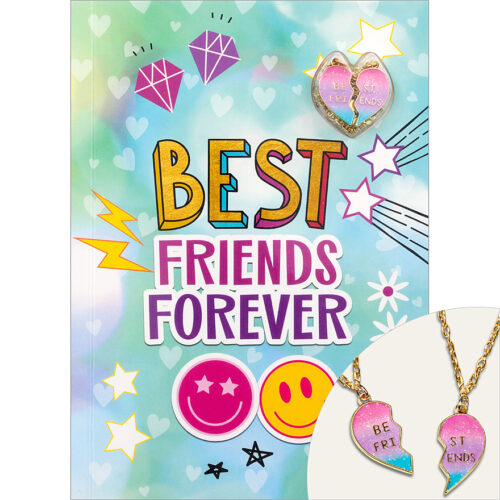Understanding Your Child’s Best Friendships
Hi there, super moms and dads! ? Welcome to our ultimate guide on understanding and nurturing your child’s best friendships. Friendship plays a pivotal role in the emotional and social development of children. It’s the foundation on which they build their social skills, learn about trust, and discover their personal identities. In this guide, we will embark on an enchanting journey together to explore the magical world of best friends and how to ensure they have a positive impact on your child’s life!
Why are Best Friends so Important for Your Child?
Every parent wants to see their child happy, thriving, and surrounded by good company. Best friends can be like stars that illuminate your child’s path, teaching them about companionship, empathy, and mutual support. Let’s dive into the reasons why best friends hold such significance:
- Emotional Support: Best friends provide a safe space for children to express their feelings and navigate through the ups and downs of growing up.
- Social Skill Development: Through these relationships, children learn to communicate, cooperate, and resolve conflicts, preparing them for community life.
- Boosts Self-Esteem: A best friend’s affirmation and acceptance can fortify your child’s self-image and confidence.
- Encourages Learning and Exploration: Friends often share interests and hobbies, making learning new skills fun and exciting.
- Provides a Sense of Belonging: Having a best friend can make your child feel connected and integral to their social world.
Identifying Healthy vs. Unhealthy Friendship Dynamics
Just as the sunniest days can have a few clouds, not all friendships are smooth sailing. It’s important for parents to discern between healthy and unhealthy friendship dynamics. A strong friendship should encompass these key elements:
- Respect: Both friends value each other’s opinions and feelings.
- Trust: Secrets and promises are just like buried treasure – kept safe and unshared with others.
- Equality: Friends share the spotlight, giving each other chances to shine.
- Communication: Open lines for sharing triumphs and tackling challenges together.
- Independence: While they are great together, each friend is also encouraged to have their own hobbies and interests.
On the flip side, keep an eye out for these potential red flags:
- Control: One friend consistently calls the shots, leaving the other feeling powerless.
- Exclusivity: A friend insists on being the one and only, which can lead to isolation from other peers.
- Negativity: If the friendship often leaves your child feeling drained or bad about themselves, it’s time for a parent radar check!
- Poor Communication: A lack of honest conversation can lead to misunderstandings and hurt feelings.
- Peer Pressure: True friends encourage each other to be their best, not to engage in activities that go against their values.
Remember, dear parents, while we can’t pick our children’s friends, we can certainly guide them towards healthy, loving relationships that enrich their lives! Stay tuned as we continue to explore this journey of friendship together. In our next section, we’ll discuss how to support your child in making and maintaining best friends. Spoiler alert: it’s about as fun as a treasure hunt! ?????

5 Essential Insights for Parents Preparing for Their Child’s Best Friends
Preparing for your child’s journey into the world of best friendships requires understanding and intentional support. Let’s look at five key insights that will help you navigate this important aspect of your child’s social development:
1. Understand that Friendships Will Evolve
Childhood friendships can be fluid, and the best friend today might be someone else tomorrow. It’s okay! This evolution is a normal part of your child’s growth and their understanding of different personalities and bonds.
2. Encourage Open Communication
Maintain open lines of communication with your child about their friendships without being intrusive. Create an environment where your child feels comfortable sharing both the good and the tricky parts of their relationships.
3. Model Positive Relationships
Children often look up to their parents as role models for how relationships should function. It’s essential to demonstrate healthy friendships and partner relationships to give your child a frame of reference.
4. Teach Conflict Resolution
Equip your child with the tools they need to handle disagreements. Emphasize the importance of empathy, listening, and finding common ground. These skills will be invaluable in maintaining long-term friendships.
5. Support Their Socialization Skills
Encourage your child to engage in social activities where they can interact with peers. This might include joining clubs, sports teams, or simply organizing playdates. The key is to help them practice their social skills in a supportive environment.
Supporting Your Child in Making and Maintaining Best Friends
As parents, your guidance is crucial in helping your child form and sustain best friendships. Here are some actionable steps to offer support:
- Be a Listening Ear: Show interest in your child’s friendships by listening to their stories and experiences. This not only strengthens your bond but also gives you a window into their social world.
- Arrange Playdates: Facilitate opportunities for your child to spend quality time with their friends. This can be through playdates, sleepovers, or participating in activities together.
- Promote Inclusivity: Encourage your child to be inclusive and welcoming to others. Teach them about the joys of diverse friendships and the value of getting to know different people.
- Help Navigate Challenges: Be there to help your child through friendship lows, such as arguments or feelings of exclusion. Guide them in resolving issues and growing from those experiences.
- Foster Individuality: Ensure your child understands the importance of being their authentic self in friendships. Celebrate their unique qualities and encourage them to seek friends who appreciate them for who they are.
Raising a child equipped with the social tools to form lasting, positive friendships is an adventure filled with laughter, learning, and lots of love. Embrace each moment, dear parents, as you watch your child navigate the beautiful world of best friendsmanship!
For more great articles please see here. For more information see here
Disclaimer
The articles available via our website provide general information only and we strongly urge readers to exercise caution and conduct their own thorough research and fact-checking. The information presented should not be taken as absolute truth, and, to the maximum extent permitted by law, we will not be held liable for any inaccuracies or errors in the content. It is essential for individuals to independently verify and validate the information before making any decisions or taking any actions based on the articles.




